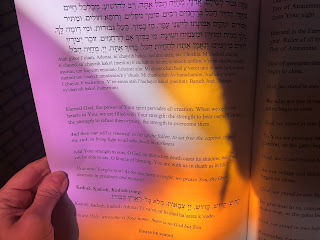My whole bout with sepsis has been sobering. And just the thought that I could’ve died last week has brought up latent fears about suffering and strength. I think we all want to die “well,” “valiantly,” in a way that will make our loved ones proud. I don’t want to be a sniveling person who’s begging to end the pain—or crying out for more life. I want to die…like Brave Heart.
But last week’s panic attack left me reeling. It seems that I’d finally grown a spine in 2020, and then the doctors removed a whole section of it right after that.
I thought of this at the Yom Kippur meeting last night. They talked about forgiving ourselves and others…about releasing ourselves from vows we’d felt forced to make (this has a pretty neat historical background) or vows we made but could no longer keep. I remembered my New Year’s resolution for 2020. “I vow to become as refined as possible,” I’d said quietly to myself. After over a year of Hell, refinement doesn’t sound quite as romantic. That’s a vow I’d like to forget.
When I returned to the synagogue for the second Yom Kippur meeting today, I honestly had no idea what to expect, but I did know something: It was time to let go of refinement and unattainable goals of perfection.
“God,” I prayed during one of the songs, “I get it now. We were never made to be perfect. I might as well be chasing rainbows, trying to reach my self-imposed goals. Can you please just love me, always…as I am? I make more mistakes than anyone I know, but I love you with everything. Please be with me in life and when I die too. I feel ridiculous asking for you to heal me; but please have your will in my life.”
I exhaled, feeling oddly lighter than I have in years. And when I opened my eyes, a strange light shone through the synagogue windows. “Kadosh. Kadosh. Kadosh. The whole world is filled with your glory.” The words wrapped around me like a balm—and when I looked down, the glowing stained glass started highlighting the words on the program I held!
“We are filled with your strength. The strength to bear our afflictions,” I read the accentuated words. “Add your strength to ours, oh God. So that when death casts its shadow we shall yet be able to say: “Oh Source of Blessing. You are with us in death as in life.”
Those words…I can’t tell you the power of those words: in death as in life, I suddenly knew God would never abandon me.
Not long after, a powerful musician stood in front of the congregation and blew the shofar (a horn of such beautiful resonance that it stunned me). The blast lasted much longer than I’d expected—then went up a fifth and continued until it vibrated me to the core.
I cried right there, my program still illuminated as I shook, my burdens lifted, and my heart full….
Before the “break the fast” celebration, I managed to catch a couple of pictures of my program before the lighting changed too much. Here’s one before and one after. I’m still amazed by God’s mercy and love: the whole world really is filled with His glory. Wow!


I love it!
ReplyDelete--Melanie
💕💕💕
DeleteBeautiful
ReplyDeleteThank you for reading it—and for all of your love and support as I’ve been going through so much 💓
DeleteThe interesting thing about that prayer is you are supposed to standing and raise your heels each time it is said. There is nothing quite like hearing a shofar blown. On the 2nd day of Rosh HaShanah, it was blown outside the place where services were held. The rainbow was a sign of a Covenant with G-d after the flood.
ReplyDeleteI love this—the sign of a promise.
DeleteYou have the most beautiful soul. Your stories always touch my heart. It's wonderful how you find the meaning, how you find God in your experiences, how you go out there and live your life.
ReplyDeleteThis means so much to me, Inger! Thank you for reading this. I was excited for you to see this one :)
Delete